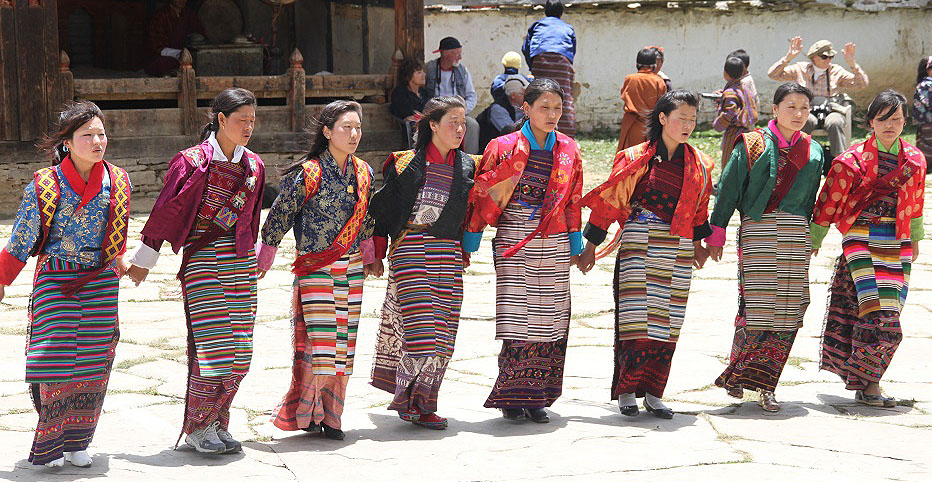Many scholars recognize the kingdom of Bhutan as the last great bastion of Himalayan Buddhist civilization to be preserved intact into the 21st century.
Sandwiched between China and India, Bhutan has maintained a long history of isolation and independence that combined to create a safe haven for the traditions of a vibrant ancient culture. But pressures of globalization are taking their toll, and the kingdom’s local languages, literature and rich, unstudied oral traditions are at risk of being swallowed as the effects of modernization spread to the remotest areas of Bhutan.
A new grant awarded to David Germano, a religious studies professor in the University of Virginia’s College of Arts & Sciences, aims to significantly contribute to efforts to preserve Bhutan’s rich and diverse oral heritage. The $363,356 awarded by the Arcadia Fund is the first year of funding for what’s anticipated to be a five-year, $1.42 million project.
The ambitious project aims to preserve through audio and video recordings an unprecedented survey of Bhutan’s oral heritage, much of which has yet to be documented or studied.
Under the leadership of Germano and his project partners, Yale Himalaya Initiative program director Mark Turin and project manager Karma Phuntsho of the Shejun Agency for Bhutan's Cultural Documentation and Research, 11 field assistants will be deployed across the kingdom’s 20 districts to explore, record and translate oral cultural traditions currently at risk.
“If we don’t record that oral knowledge, it’s just gone forever,” Germano said in a phone interview from Mongolia. “This culture faces immense pressures and challenges from globalization. We can play an important role in maintaining this rich, vital heritage.”
Advances in audio-video technology provide researchers a powerful tool for documenting and exploring traditions that now can be recorded with the crucial context of facial expressions, tones of voice and the surrounding environment.
“The problem has been that traditionally, scholarship often reduced these oral traditions to text by writing them down in a linear textual form,” Turin said. “It’s very hard to convey hand movements, facial gestures or intonation of voice in a textual format.”
The project will collaborate with scholarly institutions in Bhutan – in particular the National Library of Bhutan – and aims to complete an expansive survey of Bhutan’s various languages, oral histories, family genealogies, folk stories and songs, vernacular idioms and other genres. Researchers also will collect and record local cultural practices related to food and architecture, ecological beliefs and practices and a spectrum of traditional skills.
A website for the project (www.shejun.org) is under development.
The project is building on the work of previous projects by Karma Phuntsho, supported by Arcadia’s Endangered Archives Programme at the British Library, to create digital copies of the archives and manuscripts of Bhutan’s Drametse Monastery and seven Buddhist temples within the kingdom.
“The rich Bhutanese oral heritage as a whole is under serious threat and in an urgent need of preservation,” said Phuntsho, who grew up in central Bhutan and trained in Tibetan monasteries in India before completing a doctorate at Oxford University. “Only a few hundred people speak some of Bhutan’s minority languages. It was thus with the aim of preserving the oral traditions in audio-visual recordings that we have launched this project.
“Bhutan represents a case where we can still intervene to save what has been already lost elsewhere.”
Relying on digital library technology, the project will post audio-video recordings – and translations – on an open-access website scheduled to include searchable transcripts, essays, maps and other interactive tools.
Germano was scheduled to arrive in Bhutan this week.
“This is an extraordinarily rich culture, and it should be preserved in equally extraordinary ways,” Germano said.
The University of Virginia, under Germano’s leadership, is the acknowledged global leader in creating digital library solutions for archiving and disseminating scholarly data and analysis for Tibetan and Himalayan studies. Germano directs the Tibet Center, the largest academic organization of its type in the United States.
The Tibetan and Himalayan Library is the largest digital library in the world devoted to the Himalayan region, hosting collections of photos, audio-video, maps, place data, bibliographies, essays and much more. The library’s technological innovations are now being mainstreamed into the University of Virginia’s institutional digital infrastructure under the leadership of Germano, who was directed by the University’s Board of Visitors and President Teresa Sullivan to lead initiatives at mainstreaming digital technology at the University under the umbrella of SHANTI (Sciences, Humanities, and the Arts Network of Technological Initiative).
Arcadia is the charitable fund of Lisbet Rausing and Peter Baldwin, and works to protect endangered cultures and nature. Since its inception in 2001, Arcadia has awarded grants in excess of $237 million. For information, click here.
Media Contact
Article Information
August 5, 2013
/content/uva-professor-wins-14m-grant-record-preserve-ancient-culture-bhutan

